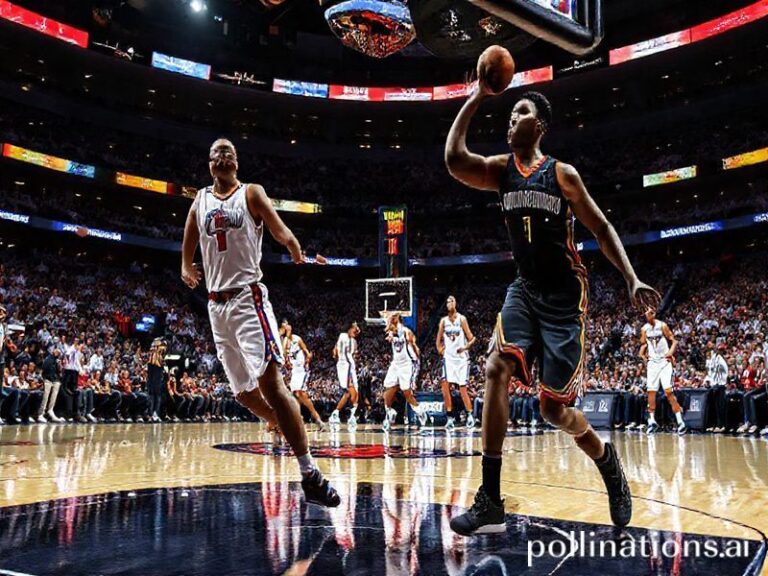Cal Raleigh’s Home Run Heard ’Round the World: How One Swing Quiets Geopolitics for 4 Seconds
The Global Importance of a Man Named Cal Raleigh—Yes, Really
By our correspondent in the cheap seats, watching civilizations rise and fall between innings
In the grand taxonomy of world-historical figures, Cal Raleigh currently sits somewhere between “that guy who invented the paperclip” and “the second-best barista in Ljubljana.” Yet on a humid Tuesday in Seattle, while half the planet argued over whose missiles could reach whose suburbs fastest, Raleigh—catcher, switch-hitter, owner of the most Pacific Northwest name since “Rainn Coffeeshop”—sent a baseball into orbit and, for roughly four seconds, silenced the existential dread of everyone watching. The Mariners won. Canada exhaled. Tokyo salarymen checked the score on bullet trains. All was briefly right with the world.
The instant replay ricocheted across continents like a rubber bullet of hope. In São Paulo, a broker who’d bet the farm on Seattle’s playoff odds high-fived a stranger wearing a Neymar jersey. In Frankfurt, an insomniac commodities trader watched on MLB.TV between oil futures tabs and thought, “Well, at least something’s up today.” And in Seoul, a teenager practicing English with baseball broadcasts rewound Raleigh’s swing until the algorithm begged for mercy. The home run was, technically, a parochial event—two American teams, one American ballpark—but the aftershock was pure globalization: dopamine delivered via undersea cable.
Raleigh himself is a walking argument for the absurdity of meritocracy. Drafted 249th in 2018, he was the baseball equivalent of the plastic-wrapped sandwich you buy at a Prague train station: uninspiring packaging, questionable shelf life. Three years later he’s the first catcher in franchise history to hit 25 home runs in consecutive seasons, which is roughly as likely as finding a functioning printer at the U.N. headquarters. The moral, if you insist on one, is that talent sometimes punches through the ceiling just to remind the scouts how little they know—a lesson that translates nicely to emerging markets, tech IPOs, and the French civil service.
Let’s zoom out, because that’s what we do here. The Mariners haven’t reached the postseason since 2001, a drought so biblical that Honduran farmers use it to explain irregular rainfall. Seattle’s front office, staffed by Ivy League quants who could be building death-drones but chose baseball instead, has been trying Moneyball 2.0: hoarding prospects like crypto wallets and praying regression to the mean isn’t a cruel joke. Raleigh’s emergence is their proof-of-concept, a living NFT that might actually appreciate. If the Mariners clinch a wild card, expect a surge in “How Seattle Did It” think-pieces from Lagos to Lahore, all missing the point that luck remains the most undervalued asset on the planet.
Meanwhile, the geopolitical undertones are delicious. Raleigh’s father, Todd, once coached at Tennessee and now scouts in Europe—yes, there are baseball scouts in Europe—meaning young Cal grew up bilingual in fastball and bureaucracy. That continental exposure shows: his framing metrics are Teutonic in precision, his plate discipline Italian in flair, and his postgame interviews pure Midwestern beige. He is, in effect, NATO with shin guards.
Back in the real world, Sri Lanka just defaulted on its debt and London’s new prime minister lasted less time than a TikTok trend. Against that backdrop, Raleigh’s nightly crouch behind home plate looks almost heroic, the kind of modest competence that makes empires nostalgic for their youth. Every pop time to second base is a quiet rebuttal to the notion that everything is falling apart; sometimes the throw arrives on time, the tag is applied, and order—tiny, ridiculous, 90-foot-square order—prevails.
Will Raleigh’s swing cure inflation, stop the methane leaks, or persuade oligarchs to pay taxes? Of course not. But for the length of a hanging slider, he reminded a scattered, anxious species that physics still allows for perfect contact, that a stitched sphere can still travel 400 feet without needing a customs form, and that even in the age of doomscrolling, someone somewhere is rounding third with his fist in the air.
And really, what more can you ask from a man named Cal?







